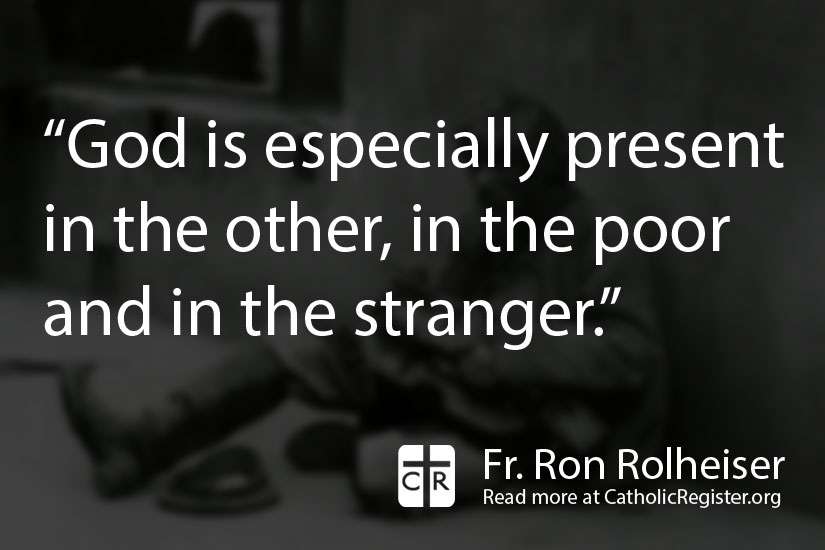In the remote, rural, first-generation, immigrant community I grew up in, we all knew each other, all went to the same church, all belonged to the same political party, all were white, all came from the same ethnic background, all shared the same accent when we spoke English, all had a similar slant on how we understood morality, all shared similar hopes and fears about the outside world, and all worshipped God quite confidently from inside that cocoon. We knew we were special in God’s eyes.
There’s a wonderful strength in that, but also a pejorative underside. When there are no real strangers in your life, when everyone looks like you do, believes what you do, and speaks like you do, when your world is made up of only your own kind, it’s going to take some painful subsequent stretching, at some very deep parts of your soul, to accept, existentially accept, and be comfortable with the fact, that people who are very different from you, who have different skin colours, speak different languages, live in different countries, have different religions, and have a different way of understanding things are just as real and precious to God as you are.
Of course not everyone has a background like mine, but, I suspect, most everyone also struggles to accept, beyond our too-easy espousal of how open we are, that all lives in the world are equally as precious to God as is our own.
It is hard for us to believe that we, and our own kind, are not specially blessed and are not of more value than others. There are lots of reasons for that.
First, there’s our innate narcissism: Simply put, we cannot not feel that our own reality is more real and more precious than that of others; after all, as Rene Descartes put it, classically and forever, the only thing we can know for sure is that we are real, that our joys and pains are real. We may be dreaming everything else.
Beyond that natural narcissism, other things begin to play in: Blood, language, country and religion are thicker than water. Consequently our own kind always seem more real to us.
Too many of us live with the notion that God has blessed our race and country more than God has blessed other races and countries and that we are special in God’s eyes. That’s a dangerously false and unchristian notion, directly contrary to the Judeo-Christian Scriptures. God doesn’t value some races and some countries more than others.
Where might we go with all of this, given that it’s hard to see how everyone else’s life is as real and precious as our own? How do we bring our hearts to existentially accept a truth that we espouse with our lips, namely, that God loves everyone equally, with no exceptions?
We might begin by admitting the problem, by admitting that our natural narcissism and propensity for tribalism do block us from seeing others’ lives as being as real and precious as our own. Very particularly, I suggest, we need to look at our false patriotism. We aren’t special as a nation, at least no more special than any other nation. Our dreams, our heartaches, our headaches, our joys, our pains, our deaths, do not count more before God than those of persons in other places in the world, perhaps even less, since God has a preferential option for the poor.
The lives of the hundreds of thousands of present-day refugees, so easy to lump into one mass of anonymity to which we can accord abstract sympathy, are just as precious as those of our own children; perhaps more so, given the truth of our scriptures about God taking flesh in the excluded ones. Today they may be the people of manifest destiny, the ones carrying God’s special blessing.
As well, and importantly, we must also correct our bad theologies. The God whom Jesus revealed and incarnated may never be turned into a God of our own, a God who considers us more precious and gifted than other peoples, a God who blesses us specially above others. Sadly, we are perennially prone to turn God into our own tribal deity, in the name of family, blood, church, and country. God too easily becomes our God. But true faith doesn’t allow for that. Rather, a healthy and orthodox Christian theology teaches that God is especially present in the other, in the poor and in the stranger. God’s revelation comes to us most clearly through the outsider, through what’s foreign to us, through what stretches us beyond our comfort zone and our expectations, particularly our expectations regarding God.
God is everyone’s God equally, not especially ours, and God is too great to be reduced to serving the interests of family, ethnicity, church and patriotism.
(Fr. Rolheiser can be reached at ronrolheiser.com)


